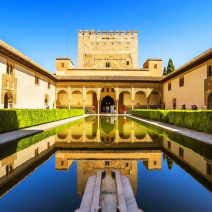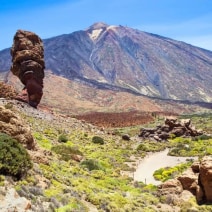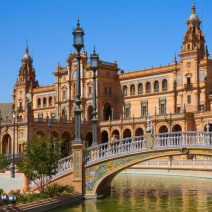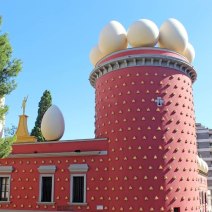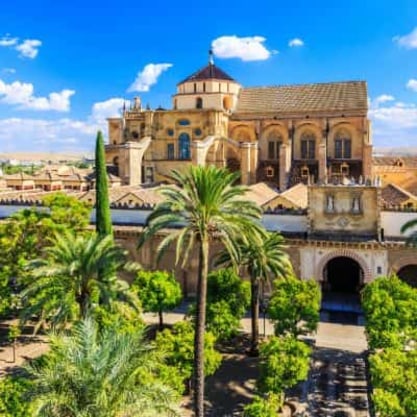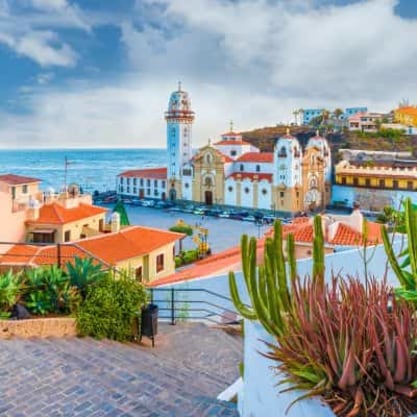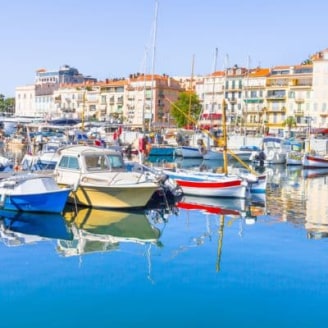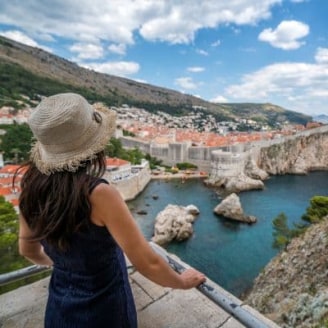Spain Travel Guide
Whether you’re looking to relax under the Mediterranean sun, explore historic landmarks, marvel at volcanic landscapes, or indulge in delicious cuisine, Spain has it all. Spain is located on the Iberian Peninsula, with additional territories such as the Canary Islands, situated off the coast of Africa. The country has a population of 47 million, and its capital and largest city is Madrid. While Spanish is widely spoken, several regions have their own official languages, including Catalan, Galician, and Basque.
Beach lovers are spoilt for choice, from the golden sands of Costa de la Luz to Tenerife’s striking black volcanic shores—but Spain’s magic goes far beyond its coastline. Its rich heritage, shaped by European Christian, Islamic, and Jewish influences, is woven into its art, architecture, and traditions. In Barcelona, Gaudí’s dreamlike masterpieces, including the towering Sagrada Família, dot the city. Seville, the birthplace of tapas, is home to the majestic Alcázar, Europe’s oldest working royal palace. Meanwhile, in Granada, the breathtaking Alhambra stands as a stunning tribute to Spain’s Moorish past.
We've outlined some general information below that may be helpful to you when planning your next holiday to Spain.

Time Zone & Currency in Spain
The currency used in Spain is the Euro. Mainland Spain and the Balearic Islands are 1 hour ahead of Ireland and the UK. The time in the Canary Islands is the same as in Ireland and the UK.

Weather In Spain
The climate of Spain is varied due to the country's size. The weather is generally reflective of it's position in the Mediterranean, and is often warm and sunny in summer and temperate and rainy in winter. The closer you get to the centre of the country, the cooler the weather in autumn and winter, while cities on the coast generally stay warm year round.

Reading For Your Trip To Spain
The Shadow of the Wind by Carlos Ruiz Zafón
Homage to Barcelona by Colm Toibin
The Hand of Fatima by Ildefonso Falcones
Best time to go to Spain
We believe the best time to visit Spain is either Spring (April to June) or in the Autumn (September to November) when it's less crowded and the weather is cooler.
Top Tourist Attractions In Spain
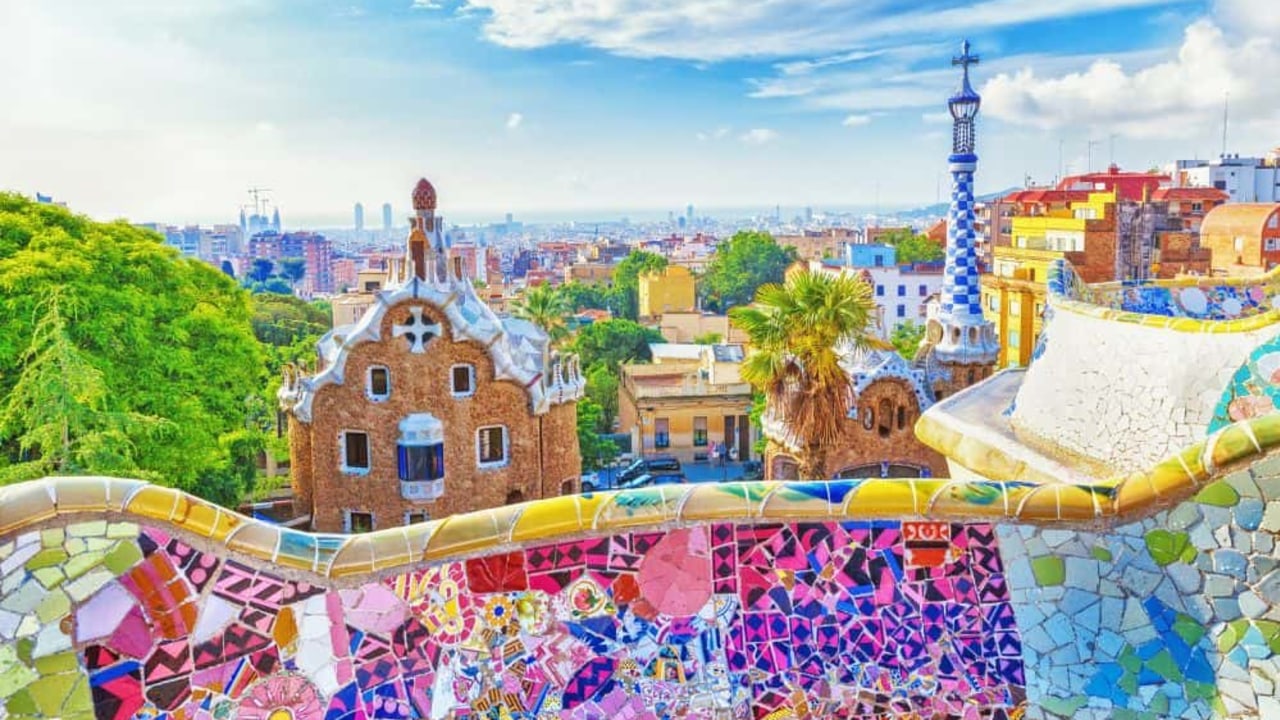
Top 5 reasons to visit Spain
Spain is rich in history and culture; it's a country full of breath-taking landscapes, historical monuments, vibrant cities and it's renowned for its delicious cuisine.
Food and drink in Spain
Spain’s cuisine is as diverse as its landscapes, with each region boasting its own specialities and flavours. From the seafood-rich dishes of the coastal areas to the hearty, meat-based cuisine of the interior, Spanish food reflects deep-rooted traditions and a love for fresh, high-quality ingredients.
Top dishes you’ll find across Spain include:
- Paella: A famous saffron-infused rice dish, traditionally made with seafood, chicken, or rabbit.
- Gazpacho: A refreshing cold tomato soup, perfect for hot summer days in Andalusia.
- Pulpo a la Gallega: A Galician speciality of tender octopus served with paprika, olive oil, and sea salt.
- Tortilla Española: A classic Spanish omelette made with eggs, potatoes, and onions.
- Churros con Chocolate: Crispy fried dough sticks served with thick hot chocolate, a beloved sweet treat.
Spain is also home to some of the world’s top wine regions, producing renowned varieties such as Rioja, Ribera del Duero, and Cava. A classic way to enjoy the local atmosphere is with a caña (small glass of draught beer) or a glass of sherry, the perfect pairing for tapas and lively conversations.
Spain Travel Guide FAQs
Can you give a brief history of Spain?
Spain has a complex, yet interesting history that spans thousands of years. It was under the rule of the Moors for 800 years and their legacy can be seen today at the Alhambra and Mezquita. In the 15th century, Spain colonised many overseas territories becoming a global superpower. Between the 1500s and 1700, the Habsburg dynasty ruled Spain and it was invaded by France during the Napoleonic Wars in the 19th century. There was political instability throughout most of the 20th century in Spain, with the civil war (1936-1939) and the authoritarian regime of General Francisco Franco. After Franco's death in 1975, Spain became a constitutional monarchy, today Felipe VI is the current King.
Do I require a holiday visa to travel to Spain?
All EU/EEA nationals must present their valid passport on arrival in Spain. A visa is not required for EU passport holders. For information on visa requirements for non-EU citizens, we recommend you contact the Spanish embassy or consulate in your country of residence. UK citizens can find further information by visiting www.gov.co.uk
Is it safe to tour Spain?
The places visited while touring Spain are generally safe and our guides will always keep an eye out for you. However, where tourists congregate, there can be opportunists and pickpockets. Be vigilant and always take good care of your personal belongings. Make use of the safe at your hotel and carry a photocopy of your passport when out and about. Always take extra care if using public transport.
Can I use my bank cards while holidaying in Spain?
Most bank cards can be used in Spanish ATMs. Most retailers accept major debit and credit cards. Identification may be requested. We recommend you contact your bank/card provider to check if transaction charges will apply.
What advice do you have for tipping in restaurants while in Spain?
Tipping in Spain is a less common practice than in other countries, however tips are always welcomed. If service charge has not been added to your restaurant bill, you could tip 5% - 10% directly to your waiter and leave a few coins in cafes and bars. Tips for hotel staff who have offered exceptional service will also be appreciated.
What kind of plugs / sockets are used in Spain?
The most common plug type is the continental two-pin round, although some hotels have installed 3-pin square sockets. We recommend you pack an adaptor, just in case.
Spain Travel Information
- For up-to-date information regarding entry into Spain please see: www.dfa.ie
- Official Spanish Tourism Board: www.spain.info


